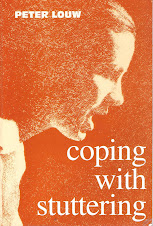Hi, my name is Peter Louw and I am from South Africa.
Stuttering, in my view, is a type of struggle behaviour. It is a partly learned, partly genetic and partly stress-related communication disorder brought on by a tendency of the vocal cords (a.k.a. vocal folds) to "lock" or "freeze" when in stress.
When the vocal cords lock, it becomes physically difficult or impossible to speak. In spite of this difficulty the stutterer will usually TRY to speak. This may result in struggle behaviour, which we see and hear as 'stuttering'. In the course of time the stutter becomes learned behaviour - a conditioned reflex.
That, in a nutshell, is what this site is all about. Though this theory of stuttering has been around for many years and explains most, if not all, of the features of stuttering that have baffled people for so long, it is not receiving the attention it deserves. In addition, many stutterers are not sufficiently aware of the exact nature of stress - in its many forms - and how it impacts on stuttering. This is to their detriment, as insight in the disorder is a first step toward doing something about it.
That's the reason why I wrote my book Coping with Stuttering (1996), and as it's no longer in print I have placed it online and updated it somewhat. You can read it HERE. While my book forms the core of what I wanted to say about stuttering, the Stuttersense blog highlights particular stuttering issues and also serves as an update of my book, which is very much based on the thinking of Dr Martin Schwartz, of the National Center for Stuttering.
I hope that, after reading my book and this website, you will see stuttering in a new light and will understand its nature. And if you stutter, you will at least be an informed stutterer and know what the options are for you. Best of luck!
Stuttering, in my view, is a type of struggle behaviour. It is a partly learned, partly genetic and partly stress-related communication disorder brought on by a tendency of the vocal cords (a.k.a. vocal folds) to "lock" or "freeze" when in stress.
When the vocal cords lock, it becomes physically difficult or impossible to speak. In spite of this difficulty the stutterer will usually TRY to speak. This may result in struggle behaviour, which we see and hear as 'stuttering'. In the course of time the stutter becomes learned behaviour - a conditioned reflex.
That, in a nutshell, is what this site is all about. Though this theory of stuttering has been around for many years and explains most, if not all, of the features of stuttering that have baffled people for so long, it is not receiving the attention it deserves. In addition, many stutterers are not sufficiently aware of the exact nature of stress - in its many forms - and how it impacts on stuttering. This is to their detriment, as insight in the disorder is a first step toward doing something about it.
That's the reason why I wrote my book Coping with Stuttering (1996), and as it's no longer in print I have placed it online and updated it somewhat. You can read it HERE. While my book forms the core of what I wanted to say about stuttering, the Stuttersense blog highlights particular stuttering issues and also serves as an update of my book, which is very much based on the thinking of Dr Martin Schwartz, of the National Center for Stuttering.
I hope that, after reading my book and this website, you will see stuttering in a new light and will understand its nature. And if you stutter, you will at least be an informed stutterer and know what the options are for you. Best of luck!






No comments:
Post a Comment